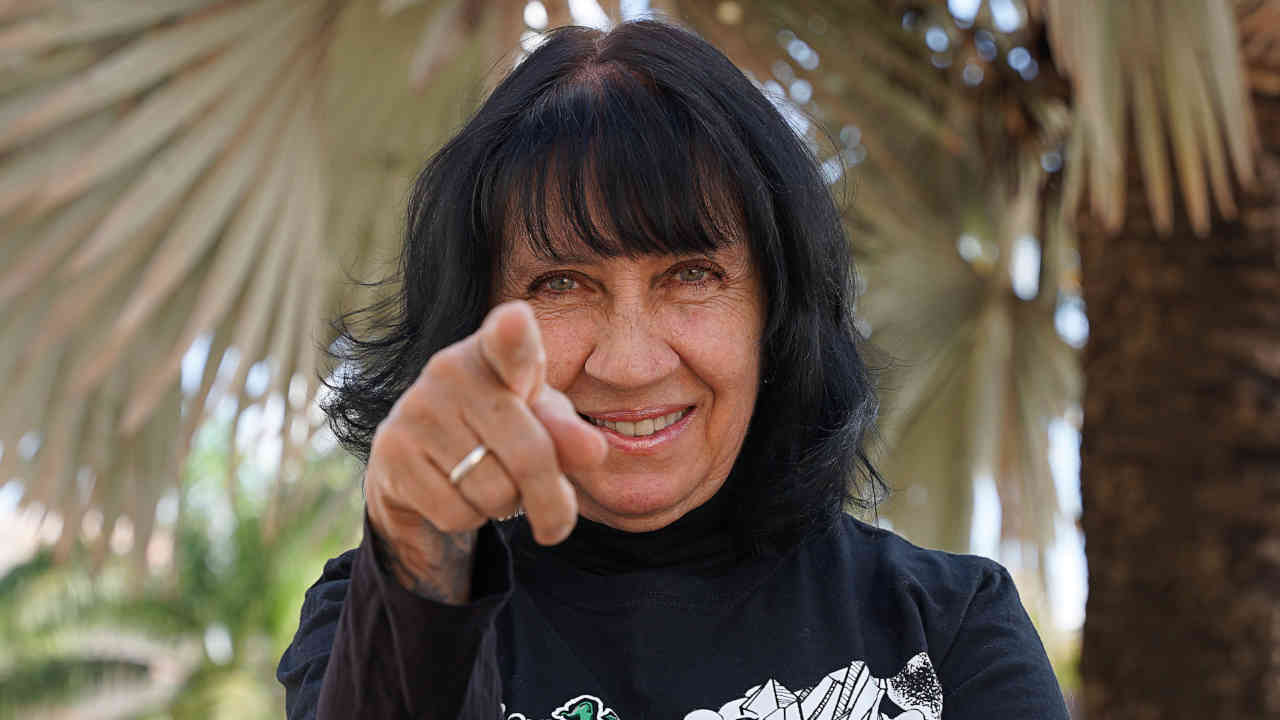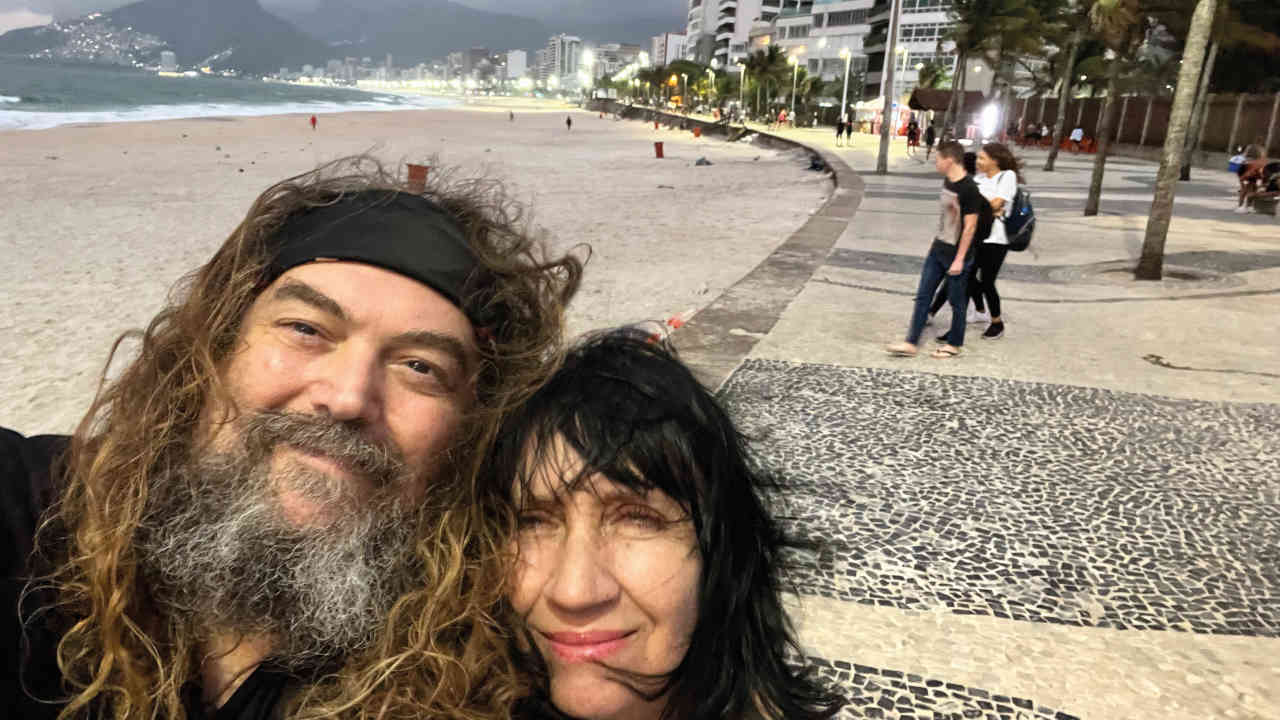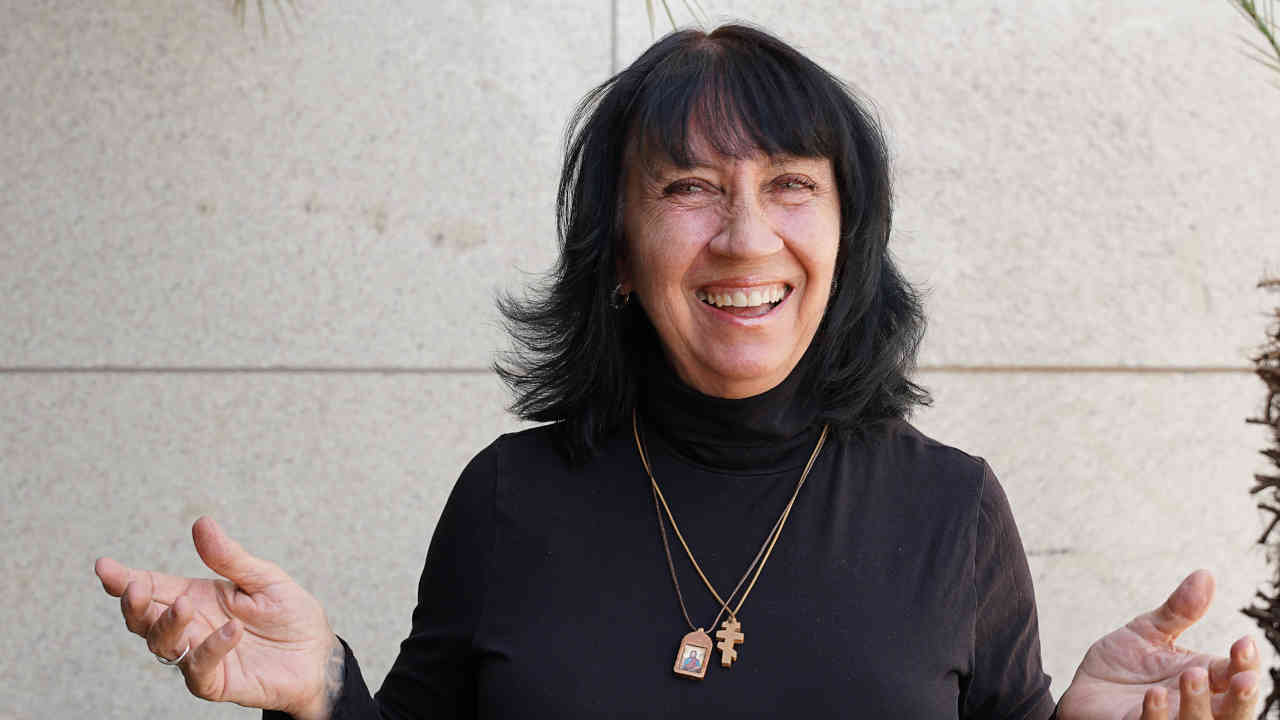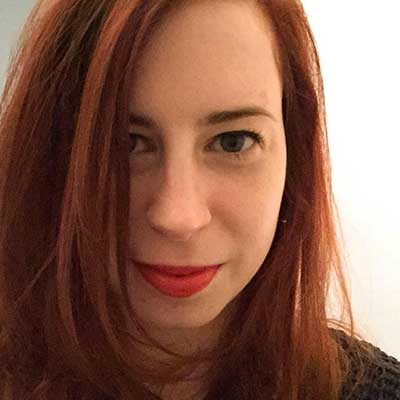A couple of months ago, Gloria Cavalera was watching a movie when her phone rang. It was 10.30pm, and her husband Max told her not to answer it. She picked up anyway. The voice on the other end was unfamiliar, but they said that their mother had passed away. Abandoning the movie, Gloria took the time to chat with this stranger. “I really tried to be the person who’s there, even though I’ve had a lot of mud slung at me through the years,” she says today. “The more mud that was slung, the more I learned about people. I think it helped me to grow a lot, you know?”
Born Gloria Bujnowski to a mother who survived a Nazi concentration camp in Austria, she was a fiercely independent spirit early on, hanging out with hippies while still in her teens. By the mid-80s, she’d embarked on a career in management, eventually going on to help turn unknown Brazilian metal band Sepultura into a global phenomenon.
Along the way, she and frontman Max Cavalera fell in love and got married. Sadly, tragedy struck when her son Dana Wells died in a car crash in 1996, plunging the family into grief. An acrimonious dispute between Sepultura and Gloria just a few months later resulted in her quitting as manager of the band she had done so much to build, with Max exiting at the same time.
Today, Gloria is still a powerhouse, looking after Max’s post- Sepultura band Soulfly alongside his many other projects, while acting as a ‘metal mom’ to her immediate and chosen family.

You were raised in South Dakota, but you left home at 16. Why?
“I’d gotten pregnant when I was 16, and I married a man who had just returned from Vietnam. It wasn’t really the best decision, but every one of those bad decisions gave me the opportunity to take a step up or a step back. And, you know, I grew up with my mother talking about being in a concentration camp [in WWII]. She was very vocal about politics and freedom, and how important freedom was.”
When did you become aware that your mum had been in a concentration camp?
“She’d sit there and say, ‘Oh, you know, I saw my friends tied to a tree with nails in their head.’ She talked about it all the time. I found a 52-page story that I wrote, I must have been 11 years old, called The Yellow Star, and it was about being in a concentration camp. I think that always was embedded in me. We actually took my mom back to the concentration camp that she was in [Mauthausen in Austria], and they said that she was the first woman survivor that they recalled had come back to see it.”
In the early 80s, you ran a bar called Bootleggers in Phoenix, Arizona, with your brother. How did that come about?
“I was managing a famous pizza restaurant called Beau Jo’s in Colorado. My brother was an oil surveyor, and he was like, ‘I’m tired of working for someone else, and you’re working for someone else – let’s go buy a club.’ We pushed the pool tables together and made a drum riser. We went out at night and swiped milk crates from all the businesses around us. And we got some sheets of plywood, and then we made the stage. [Jason Newsted’s original band] Flotsam And Jetsam became our house band.”
After the bar was closed down by the city in 1986, you began managing Sacred Reich. How did you figure out what to do?
“I was pregnant with my fifth child, Jason, and I fell into a bit of a depression because we basically lost every single thing that we had. [Sacred Reich guitarist] Jason Rainey called me one day and he goes, ‘Will you manage us?’ and I was like, ‘Sure, I’ll manage you.’ Then I hung up, and I was like, ‘What does a manager even do?’ It took me a year and a half to get a tour; I couldn’t get a tour to save my soul, it was so hard! Ha ha! When I finally got a booking agent, he gave us a tour for two weeks – then he got thrown in prison for tax evasion during the tour! I went on all the tours. I’d sell the merch, and manage from behind the merch table.”
How did you manage with five kids back in ’86? That’s quite a responsibility.
“It was really hard. I would work all day long on the phone. At five o’clock every day, I would work at a company selling Time Life books, and that was where I learnt, ‘Don’t take no for an answer’, because I needed to make the income to do my other job, and also take care of the family.”

Who were your early mentors?
“When I was first starting, [Roadrunner Records founder] Cees Wessels was always very open, he’d listen, even when I went off on my tangents! Ha ha! [Possessed manager] Debbie Abono showed me friendship and trust, loyalty and love. She also had five children, and she was a single mom, and so we shared a lot in common. She had a son who was murdered also.
When Dana died, that’s when I really began to look up to Sharon Osbourne. She was this enigma, was a queen on a mountain. And then when I started to know her, I realised her heart was bigger than anyone I had ever met. She was so positive and so happy, and she had also been through so many things.”
How did you get involved with Sepultura?
“[Roadrunner A&R executive] Monte Conner asked me if I would manage them, and I was like, ‘I don’t really know them.’ I got a gig for Sacred Reich with King Diamond at The Ritz in New York [in 1989]. Sepultura were on there, and Cees had invited several managers.
When I got there, all the managers came up to me and said, ‘Don’t take them’ – they were foreigners. My mum was a foreigner, so I didn’t really pay much attention to any of that. Their set was brilliant, and the first thing that was in my head was, ‘Somebody’s gonna take advantage of these guys.’ So I went and sat down next to Cees, and I was like, ‘OK, I’ll take ’em’, and he started laughing.”
What was your first impressions of them?
“They were playing in The Mason Jar [in Phoenix], and so I met them there. They were all crammed into a van, they didn’t have water onstage, Paulo [Jr, bassist] had this pick that looked like a mouse had been chewing on it for a month. They were signed to some manager, some person who managed someone like [R’n’B legend] Eartha Kitt. I was like, ‘I don’t know what you guys are doing with that manager.’
I don’t steal artists, and so they negotiated some kind of deal with Roadrunner and they paid that manager to free them. Then I got this little postcard from Max: ‘I really hope you’ll work with us, Kisses, Max.’ I said, ‘OK, I’ll work with you guys for one year, but I’m not gonna take any pay.’ I wanted to know if we were even gonna get along. Then, right away, they had me buying their shoes, their lunches… ha ha!”
What made you think you could break this underground Brazilian band?
“I never really looked at it as if I could break anybody. I looked at it as if I could do better than what they’d been doing. When I did my first meeting with them, I said, ‘The first thing I’m gonna tell you right now is never, ever say you’re death metal again, just be metal’, and they were like, ‘Huh?’, and I was like, ‘Trends die, and I want you to be something solid, not just something that’s here for a minute or two.’
At first, when I was with Sepultura, it was more like a party type of atmosphere, everybody was drinking, doing shots onstage. Then as I could feel things growing, I made a step to change myself to be more of a professional manager, and really put time into the bills.”
Did you and Max have an instant connection, or did it take a while for your relationship to get off the ground?
“We just realised that we were starting to have feelings for each other, and I was like, ‘Oh…’ I didn’t know how to tell the kids, I didn’t know how to tell people, I didn’t know how to tell myself that we were falling in love with each other, it was just so gradual. You know, even when we got married, I didn’t want to get married. I’d had failed marriages and I didn’t really believe in marriage; we had already had Zy [Zyon Cavalera, born in 1993], and things were going along really good.
We bought a house, then because of Max’s Brazilian nationality, he had to leave and come back and forth. He was like, ‘I don’t want to do this anymore.’ Once Max and I started our relationship, he didn’t want me to manage other bands or be on tour with someone else, so I just gave it my all.”

You lost your son Dana in August 1996. That’s an awful thing for a mother to go through. How did you get through it?
“I really got through it because Dana’s girlfriend moved into our house, and we went out trying to solve his murder. Max was in the bedroom, writing, then at the end of the day, we would put our day together. We leaned on each other so tightly. I remember when we went to do Head Up [Deftones’ tribute song for Dana] – when I see pictures of me now, I’m like a skeleton. I remember I couldn’t eat, I was like, ‘Well, Dana can’t eat, how can I eat?’
It was Max who pulled me to him even more. I didn’t think I’d be able to survive that. Grief is like a lion; you never know when it’s gonna pounce. Spirit Animal is the new Soulfly song. It starts out with our granddaughter, she was a few months old, she was growling, and that’s written for a group of bereaved parents that I’m with on Twitter.”
Sepultura said they fired you as a manager after their show at Brixton Academy in London in December 1996, but you told us that your contract had run out. Some fans blamed you for the split, but you encouraged Max to stay, didn’t you?
“Yeah, I told him to stay with them. I’m like, ‘You know what, I can manage a million bands, and this is your baby, you need to stay.’ But really, Dana’s death was such a big turning point for Max and me both; it ripped our eyelids off. It made our eyes see what was going on, and the things we were telling ourselves weren’t going on because we didn’t want them to be going on.
I had just buried my son, and I was told that two weeks was long enough, get on the road, act like a professional. When I made the tour to end on the last day of my contract and I walked out of that room, there was so much chaos in the bus, and chaos everywhere, fighting and drunken behaviour from people. To me, it was like I left my chains in Brixton, and I walked on.”
What happened next?
“I didn’t know where I was going to go or where I was going to end up, but once you bury a child, a band is a band, and you get your feelings in perspective in a different way about life in general. Max came home and started writing right away. He wrote [Soulfly songs] Eye For An Eye and Tribe. Then we both found different ways to take care of that horrible feeling, that betrayal. It was so incredible to have all these things happen all at once.”
What’s your relationship like with Max today compared with when you met each other?
“We’re used to each other now, we’re a parallel entity, and I think we’ll stay like that. His goal is to get a motorhome, take off for a year, and drive around America seeing different things. We’ve spent so much time working and touring, so I think we’re looking for a bit more time to spend with each other, even though we’ve spent every minute together. We’re looking for some personal time.”
How long do you see yourself being a manager? Do you think you’d ever hand the reins of Max’s career to someone else?
“I’m probably gonna turn into dust on a stage somewhere, to be honest with you. That guy is not gonna give me a break! I don’t see myself stopping for a while just because it’s so much a part of our life. It’s just a big tapestry that goes together.”
What do you think your legacy is?
“I really don’t know. I think it’s got a dark side, to be honest with you, which makes me a little sad sometimes. One time, a publicist I worked with said, ‘It’s a shame you’ll probably be mostly remembered for something that you didn’t even do’, and so I don’t really know that I would have a legacy that I would appreciate having.”
It’s a shame you can’t see the brighter sides of it, because you have done so much in your career, and you have your family as well…
“Somebody said to me, ‘How do you feel about being called Yoko Ono?’ and I said, ‘Are you fucking kidding me? I’m compared to a Beatles wife?’ That’s the most spectacular thing in the world; John Lennon was the coolest Beatle by far, and I’ve got a pretty cool guy, too’, ha ha ha! I don’t think it was the answer they [expected] from me.
I wish my legacy would have been a bit more polished, but things happen in your life, and with social media, a lot of things get out there. I hope that I’ll be known for being a woman who was able to bring a lot of art and helped a lot of people when they had bad times. Music saves, and I’d like to be known for being a compassionate, humble person.”
Soulfly’s latest album, Totem, is out now via Nuclear Blast

